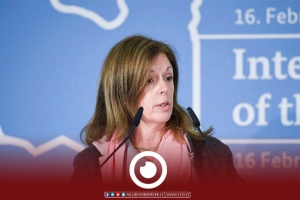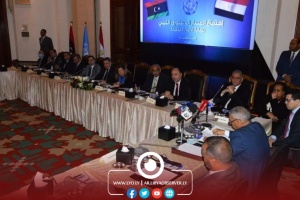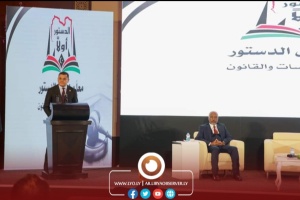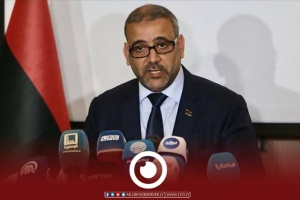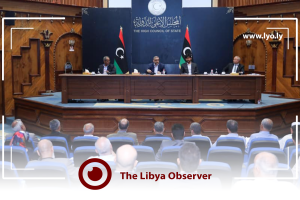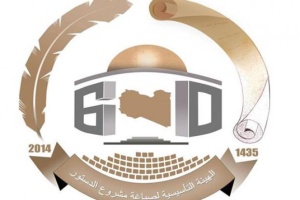This is chapter Seven of the Libyan constitution that was approved by the Constituent Assembly on July 29
Libya Constitution – Chapter Seven

Chapter Seven
Independent Constitutional Bodies
Article 154: Independence of Constitutional Bodies
Bodies provided for in this Chapter shall enjoy a legal personality as well as administrative, financial and technical independence. They may be consulted on draft laws relevant to their area of expertise. They shall carry out their work in accordance with the provisions of the constitution and law. Their geographical distribution throughout the country shall be taken into account.
Article 155: Management of Constitutional Bodies
The legislative authority shall elect independent persons of competence and integrity to manage these bodies. Those persons may only be removed from office before the end of their term if they fail to meet any of the conditions of their election or in the cases stipulated by the law.
Article 156: Legislative Authority Oversight over Bodies
The constitutional bodies shall be subject to the monitoring of the House of Representatives and shall submit work reports thereto as regulated by the law. They shall also submit reports to the Council of Ministers. The House of Representatives may publish these reports following their discussion.
Article 157: High National Elections Commission
The High National Elections Commission shall exclusively undertake the management and organization of public referenda as well as all stages of the general and local elections with transparency and credibility, including announcement of the final results. The Commission shall be run by a board of nine members among whom is the chairperson who shall be elected by the legislative authority. They shall carry out their tasks for one term, which shall last six years. The term of one third of the members shall be renewed every two years.
Article 158: Audit Bureau
The Audit Bureau shall be the highest authority for financial control and audit in the State. It shall be competent with comprehensive oversight of State funds, the parties financed by the State, in whole or part, and any other bodies specified by the law. It shall also have the authority to track these funds. The Audit Bureau shall be run by a president with the capacity of public audit and one or more deputies with the capacity of an [agent] who will undertake their duties for a six year term renewable for one time.
Article 159: National Council for Human Rights
The National Council for Human Rights shall strengthen, promote and spread the culture of the values of human rights and public liberties provided for in Islamic Sharia and international conventions. It shall also:
1- Observe human rights conditions and monitor violations thereof. It shall report these violations to the competent national authorities and follow up on this.
2- Support the citizens in gaining their rights endorsed by the Constitution and the law.
3- Support women to obtain their constitutional and legal rights and to ensure that they are not discriminated against.
4- Recommend ratification of, or accession to, international covenants of human rights in a way that is not incompatible with the provisions of the Constitution.
5- Promote cooperation with the national and international human rights organizations.
The Council shall consist of nine members where representation of cultural and linguistic components as well as women and youth shall be taken into account. They shall carry out their duties for one term of six years. The legislative authority shall elect the president with the capacity of a commissioner and a deputy from among those members.
Article 160: National Council for Protection of Cultural and Linguistic Heritage
The Council shall develop and protect the languages such as Arabic, Amazigh, Targhey and Tebu, and shall preserve, document and devote attention to the diverse cultural and linguistic heritage of the Libyan people to ensure the preservation of its originality within the framework of the collective Libyan identity. The Council shall be run by nine members where representation of the cultural and linguistic components of the Libyan people shall be taken into account. The legislative authority shall elect a chairperson from among the members for one term that shall last six years.
Article 161: Sharia Research Council
The Sharia Research Council shall assume the following duties:
1- Express opinions on matters referred to it by State authorities to analyze and form opinions based on Sharia evidence
2- Conduct specialized Sharia research to address current general religious issues, seeking the help of specialists in all fields, and giving recommendations therein
3- Issue individual fatwas on beliefs, acts of worship, and personal transactions, taking into account the dominant jurisprudential heritage in the country.
The Council shall be made up of fifteen members who are specialized in Islamic Sharia selected by the legislative authority for a six-year term renewable for one time. There shall be a president and vice president presiding over the Council for three years term. The Council shall also have a number of specialists in various fields. Geographic distribution shall be taken into consideration when selecting the members of the Council, and it shall have branches in accordance with the regulations of the law.
Article 162: Sustainable Development Authority
The Sustainable Development Authority shall assume the following tasks:
1- Recommend the appropriate measures to achieve balanced and sustainable development.
2- Propose appropriate polices, plans and programs to build and develop human capabilities, diversity of resources and identify national development priorities to ensure convergence of development level among the different regions.
3- Offer technical advice on development plans at the local and national levels.
4- Assess development plans and their implementation in the light of the balanced and sustainable development indicators and the need to maintain the rights of the future generations.
The Authority shall be managed by a council made of six members elected by the legislative authority which shall determine who will be the president and vice-president for a period of six years that can be renewed only once. One third of members shall be renewed every two years.
Article 163: Other Bodies
The law shall establish bodies for administrative oversight, transparency and anti-corruption, statistics, higher council for media and press and a council for science, technology and innovation. The law shall determine their composition, competencies and regulations, and shall guarantee the independence and impartiality of their members in accordance with what is stipulated in this Chapter.
____________________________________________
Chapter One - Chapter Two - Chapter Three - Chapter Four - Chapter Five - Chapter Six


